



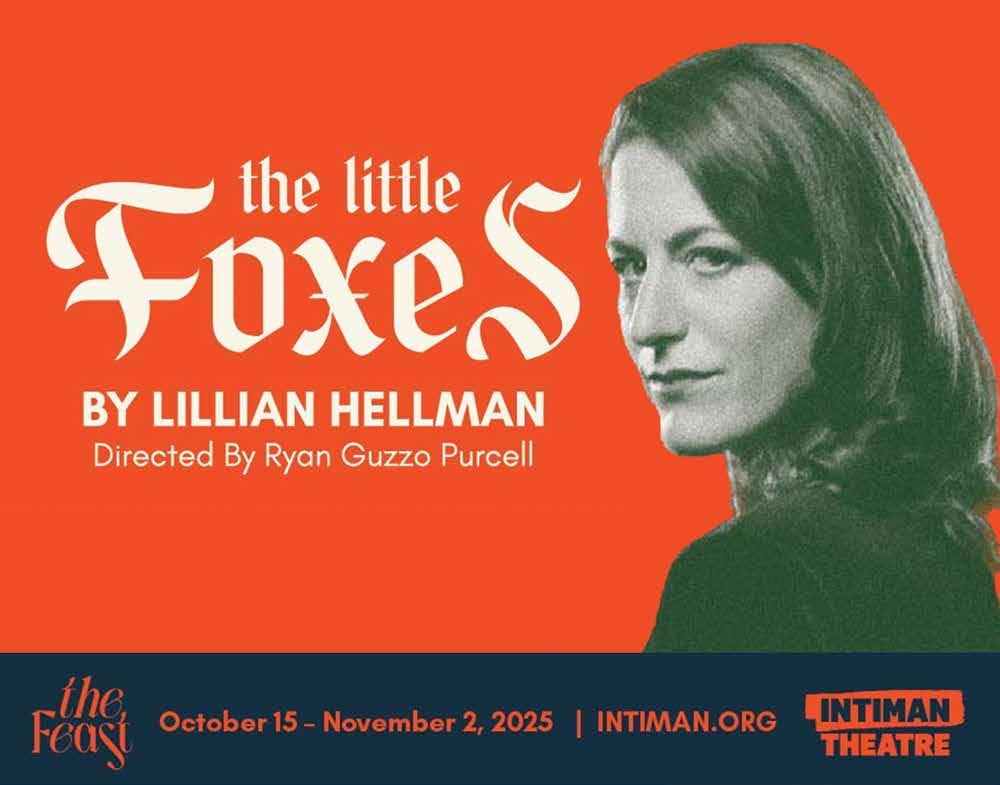
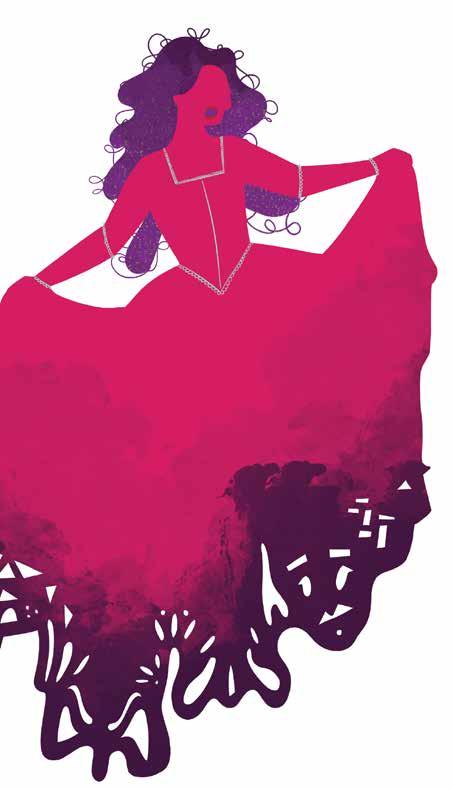




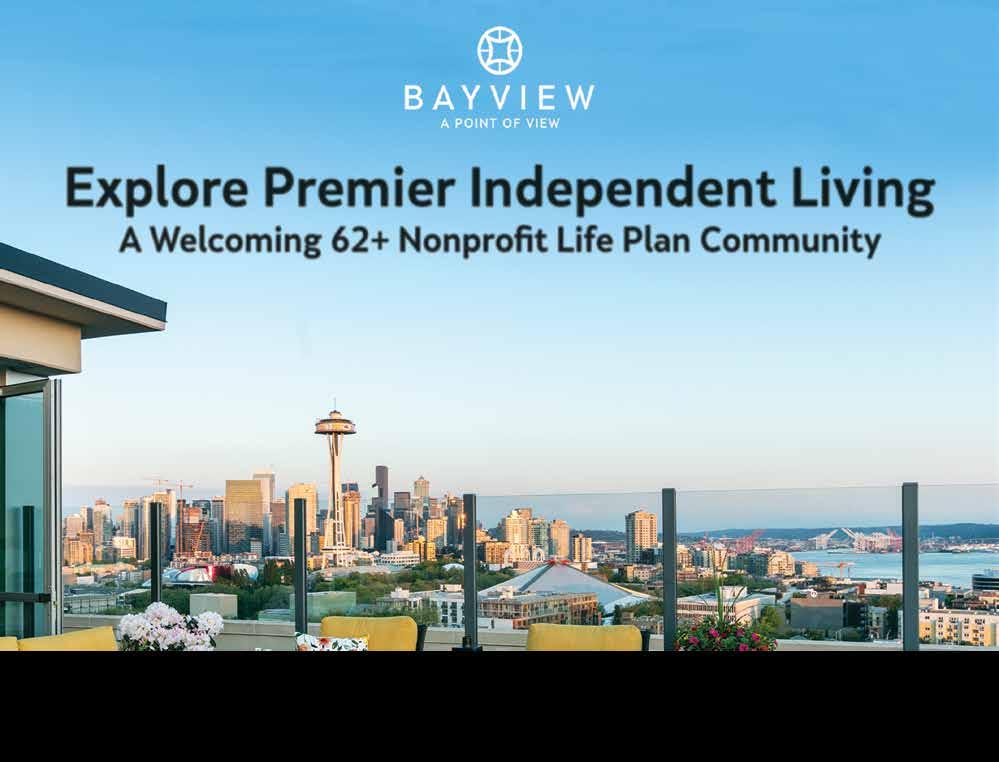


























BY ARIN WALLER
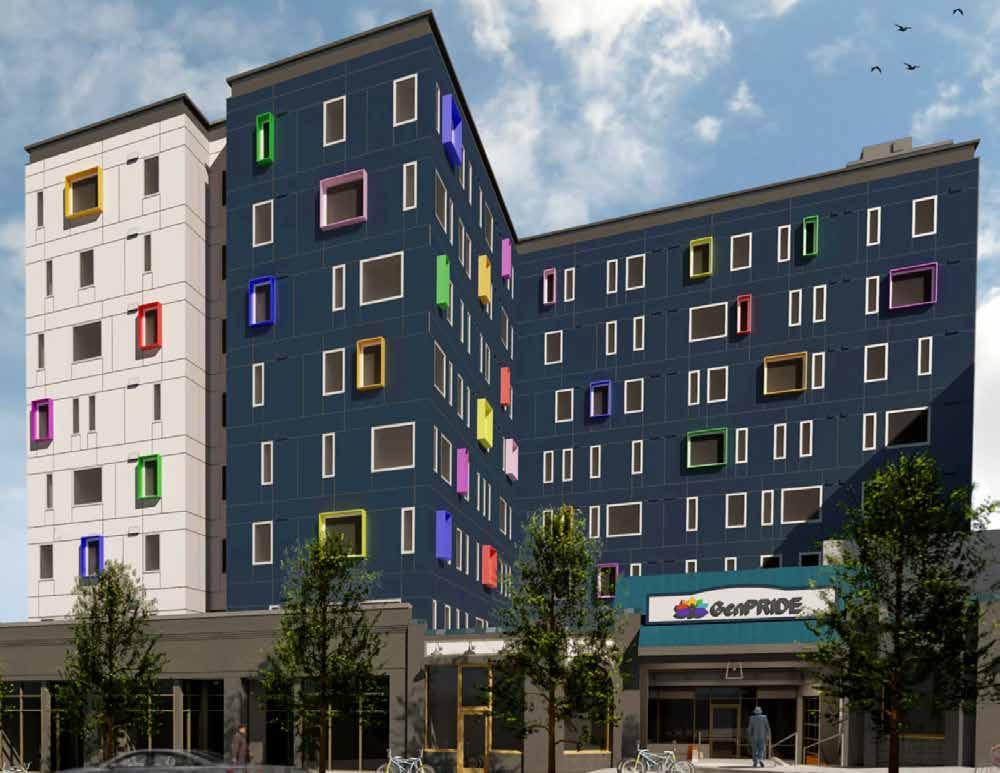
This month’s edition of the Seattle Gay News is focused on home and finance, and the advancements made by the LGBTQIA+ community in the job and housing market, with an emphasis on Queer-owned businesses and other success stories in our community. However, it cannot be ignored how underrepresented Trans people are in both housing and employment.
According to Advocates for Trans Equality, one in five Transgender people has faced discrimination in the housing market, and one in ten has faced eviction because of their gender identity. The Trevor Project reports that homelessness is at a higher rate among Trans youth than any other LGBTQ+ group, with 38% of Transgender girls/women, 39% of Transgender boys/men, and 35% of Nonbinary youth experiencing homelessness and housing instability, as compared to 23% of cisgender LGBQ+ youth.
The US Trans Survey shows that unemployment went up 3% in 2022 among respondents to a total of 18%, and that more than one-third reported experiencing poverty.
Moreover, a survey conducted by the Williams Institute suggests that more Trans people are looking to flee to sanctuary states since the inauguration of Donald Trump and the increase in anti-Trans state legislation this year. Seattle is an exceptionally popular sanctuary city among Trans refugees, experiencing a considerable boom in the population of Transgender people from conservative states this year.
Though these statistics aren’t enough to provide a full picture, Trans people are more than numbers on a graph or a percentage. To offer more insight, Violet Kawaguchi of the Kawaguchi O’Connor Initiative (KOI) explained that the group began in November 2024, after the election, in the online forum knockout.chat, when a lot of its Trans participants in conservative states went to a dark place, fearing they were going to lose their healthcare. Several
people reported being immediately made homeless after the election because of their parents being emboldened by Trump.
Obstacles
It was then that Kawaguchi began rallying people and moving them to Seattle, as well as directing Trans refugees to public services, such as SNAP and Medicaid.
“We found that a lot of the other orgs aren’t really offering those services, and in our experience, the people who are fleeing do not have the skills to do a lot of this on their own, and certainly aren’t in the headspace to do this on their own, because they just fled a red state, they’re traumatized,” she explained.
As for the hurdles that she has noticed
that Trans people face, Kawaguchi said that most of the people she has helped move out here had issues gaining employment: “The median time for someone to get employment has been four to five months at a minimum,” she stated. “A lot of that is due to the job market being really bad right now, especially here in Seattle. If you are not someone who is extremely overqualified, you are not going to get a job very quickly, [which] is what we noticed, especially for Trans people, who experience additional bias and discrimination compared to the average person. [Employers] can’t outright not hire you for being Trans, but they can definitely push you to the bottom of their preferred candidates and not hire you, and not say why. Because
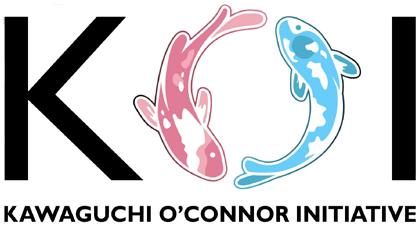
of this, a lot of people haven’t [been able] to accumulate workplace experience.”
Regarding housing, Kawaguchi said that the greatest success her organization has had is getting people into Multifamily Tax Exemption (MFTE) apartments and describes the housing market as “interesting.”
“The thing is, most of these people are getting jobs that will only give them maybe half of the income they need to get these apartments, so they need to group up,” Kawaguchi said. “And that’s an additional problem for Trans people, because a lot of them aren’t comfortable shacking up with the vast majority of people. A lot of Trans people don’t have the social skills or social space to get the contacts they need to get roommates a lot of the time. That’s one of the things we’ve been trying to provide to people.”
One story from a Trans refugee highlights the adversity many face: “Before I made it to Seattle, I was trapped with a family that had prevented me from getting [hormone replacement therapy] for two years, and who treated me terribly. I was being regularly verbally abused and shamed, and I felt afraid to be myself, hiding in my room nearly all of the time. At times, I was even afraid to leave my room just to eat or use the bathroom. I had been trapped there for a long time, and had long given up hope that anything better would come. I resigned myself to never being able to be myself in my own home, let alone in public. The only times I ever felt like I could actually be myself was when I was hiding in my room, wearing feminine clothes that I had secretly gotten for myself.
“Now that I’m in Seattle, I can actually be myself, whenever I want, and I feel comfortable being who I am, and who I’m becoming.”
For more information on the Kawaguchi O’Connor Initiative, go to https://koinitiative.org
COURTESY KOI
SGN 2025 homebuyer’s guide to Seattle (according to the experts)
BY MADISON JONES SGN MANAGING EDITOR
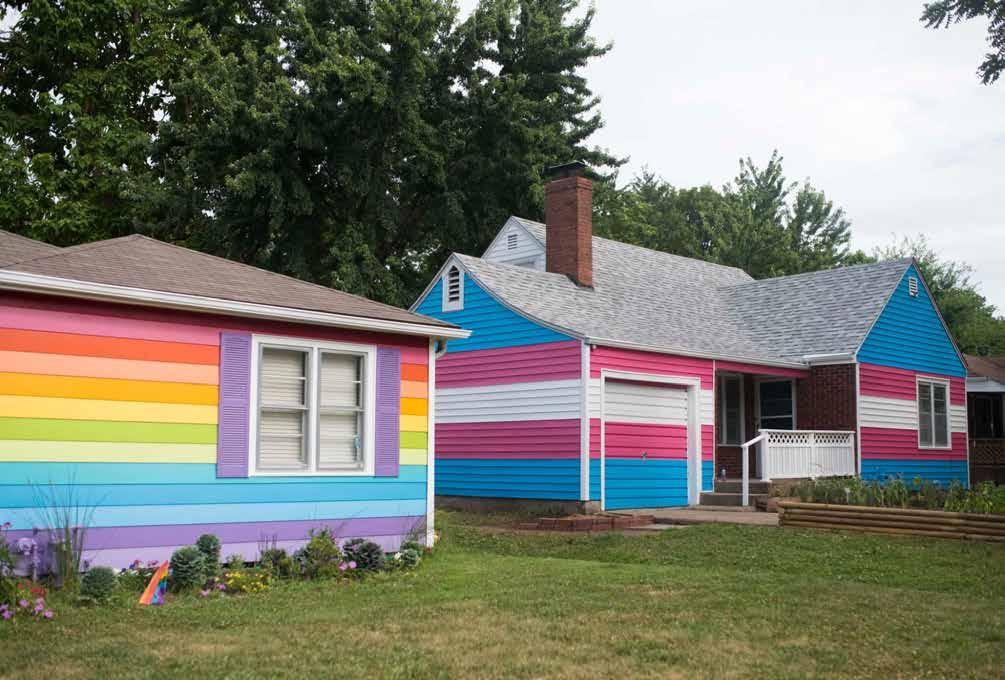
In 2025, buying a home remains a tricky endeavor for those seeking to make Seattle their long-term place of residence. Despite a recent pledge by the Trump administration to increase homeownership and the lowering of interest rates by the Federal Reserve to 4–4.24% (which has knock-on effects on mortgage rates), a teetering job market and ongoing affordability crisis have left 72% of Americans feeling pessimistic that now is a good time to buy a house.
While there is no doubt that buying a home in the Seattle area today requires saving up a pretty penny (or several million of them), the SGN decided for this year’s Home & Finance issue to reach out to some Queer experts in the area’s real estate and home mortgage industry to share their perspectives on today’s housing market landscape, and offer any advice they may have for LGBTQIA+ people looking into available options.
Jeanne Sickel is branch manager and loan officer at CMG Home Loans in West Seattle. With her years of expertise in home financing, she gave the SGN several tips and guidance to share with LGBTQIA+ homebuyers on how to navigate the complexities of financing in Seattle’s market in 2025.
As a preface, Sickel began her advice by addressing the current home-buying
climate: “Here’s my take on today’s real estate market and how buyers can break into homeownership, even in a historically tough market. Seattle has long been known as a competitive real estate market, and it continues to move at a relatively fast pace.
“However, after the intense activity of the spring season, we’re seeing a typical seasonal slowdown heading into fall. With people returning from summer vacations and kids back in school, this shift is normal — but it also presents new opportunities for buyers. Notably, inventory is up this year compared to last. That means more homes on the market, less competition, and more leverage for buyers. If you’ve been waiting for a window to enter the market, this could be it.”
The first tip Sickel has for Seattle’s Queer homebuyers is to use their leverage, and ask for seller credits or rate buy-downs. She explains that now with “more homes and fewer bidding wars, buyers can negotiate. In this market, you can ask sellers to cover your closing costs, offer a rate buy-down, or even reduce the price. “But what’s the smartest option? Consider that a $10,000 price reduction might save you ~$60/month on your mortgage. Using that same $10,000 for a rate buy-down could save you $100+ per month — a better path to long-term affordability.”
The next tip she suggests people consider is buying a home together with friends.

“More buyers — especially renters — are teaming up with friends to purchase homes together. This approach can dramatically lower your monthly costs and allow you to build equity as a team.”
Sickel gives an example of how this might work in practice: “If four friends bought a $1 million home five years ago, each person’s share would be $250K. Today, that home might be worth $1.22 million (4% average annual appreciation). After selling, each person could walk away with ~$25K in equity. Add in rent savings of ~$1,000/month per person over five years, and that’s another $60K saved. It’s a smart financial move, not just a living arrangement.”
Although splitting costs among friends can be mutually beneficial, she does caution that “if you go this route, protect your investment: Get legal agreements in place that detail ownership shares and what happens if someone wants out. Keep good records. Most importantly, set up wills and estate plans to protect everyone’s interests.”
Another unconventional tip Sickel has for prospective homebuyers is to reconsider condos — especially DADU condos — explaining that “Seattle allows detached accessory dwelling units (DADUs) on single-family lots to be sold as ‘condos.’ But these don’t always look or feel like traditional condos — they’re often standalone small homes with their own yards and entrances. This is a creative and affordable
path to ownership, especially for first-time buyers. Many have low or no HOA dues and are often priced significantly lower than traditional single-family homes, sometimes even less than traditional condos, which can carry HOA fees of $400–700/month.”
The last tip Sickel shared was that if living in a DADU isn’t an option, prospective homebuyers in need of more space might instead consider buying a house with a rental unit (accessory dwelling unit, DADU, mother-in-law suite, or duplex) to help cut down on costs. She points out that “homes with secondary units offer built-in income potential. While the purchase price might be higher, rental income can offset your mortgage.”
As an example, she said that if the price of a home is $750K, with a 20% down payment and monthly payment of ~$4,300, having rental income from a separate unit charging $1,600/month would result in a net monthly cost of only $2,700, which is significantly lower than the $3,750 that average renters pay for a house in Seattle today, according to Zillow.
The benefits
Sickel believes the overall benefit of homeownership is worth the trouble: “One thing I’ve learned about homeownership: we all pay to live somewhere. When you rent, you’re paying someone else’s mortgage, and you’re at the mercy of rising

rents, landlord decisions, and potentially deferred maintenance. But when you own a home, your mortgage payment is largely fixed (aside from taxes and insurance), and you’re building something for yourself.
“Homeownership is more than shelter; it’s a financial anchor. As you build equity, your home becomes a powerful tool. You can borrow against it to fund education, invest in another property, pay off debt, or navigate life’s big moments.”
Sickel acknowledges that the homebuying elephant in the room — down payments — “can often be a big barrier for folks to get into homeownership. However, there are more options than most people realize: down payment assistance programs are available at the city, county, and state levels. Some lenders (like the one I work with) allow you to crowdsource your down payment — a normally ineligible source, now approved through special programs.
Certain retirement accounts offer penaltyfree withdrawals for first-time homebuyers. And there are even a few 0% down loan options worth exploring.”
Overall, Sickel encourages prospective LGBTQIA+ homebuyers not to give up.
“For me, buying a home was the best decision I ever made for my financial future,
she said, “and I’m passionate about helping others make that same step toward stability, security, and independence.”
Real estate tips for Queer people
Christina Castillo works at Ensemble, a boutique Seattle-based real estate brokerage founded in 2023. “I would say a lot of the brokers that make up Ensemble are part of the LGBTQ+ community,” she said, “but not necessarily focused on [LGBTQ+] buyers and sellers. But I think, you know, we end up probably working with a lot of buyers and sellers in the community.”
Castillo told the SGN that although about 90% of her LGBTQIA+ clients are looking for homes in the Seattle area, those considering more affordable options tend to look in more rural parts of Washington. The advice she usually gives them is to spend time in the community and get a feel for if it’s a good fit, explaining that “we’re in a bubble in Seattle for the most part, and [so when] going into small towns, I always encourage buyers to go eat at a restaurant, go to the grocery store, talk to the people, look for Pride flags hanging in other people’s yards.”
As for specific Queer-friendly housing markets outside of Seattle, Castillo
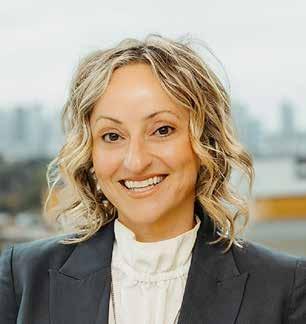
explained that she makes an explicit effort as a realtor not to “steer” clients into specific neighborhoods, making sure she follows all guidelines under the Fair Housing Act. However, she did stress the importance of LGBTQIA+ buyers going out on their own to experience places firsthand to help them make their decision.
Another type of advice Castillo had for prospective Queer homebuyers was to heavily vet the people who’ll be part of their journey, saying it doesn’t matter “if it’s your realtor, if it’s your lender, you know because you want to be best represented by them.”
One aspect of Castillo’s work as a Queeraffirming realtor, she told the SGN, is to makes sure the people her clients come into contact with address them properly. She notes that sometimes not all Trans and Nonbinary clients will have legal documents that line up with their name or gender identity, and in those instances, it’s essential to choose a team that will advocate on their behalf. She notes that the process of buying a home is already a big ordeal, so make sure “somebody [is not] constantly referring to them as their deadname.”
As a realtor, Castillo also prioritizes
working with LGBTQ+ and POC vendors throughout the process, despite it being a conventionally male-led industry. Homebuyers can also choose who they want to work with.
Whether it be understanding home lending options, how to feel out a potential neighborhood, or not choosing the first realtor clients meet with, Castillo recommended meeting several realtors to get a feel for “somebody that you can trust in this situation or you feel like is going to have your back in this. That’s what I always try to do with my clients: make sure that they feel good and know that they can trust me.”
To Castillo, the importance of buying a home in a person’s life — whether they be LGBTQIA+ or not — cannot be understated. In friendly jest at the end of her interview, she said, “I always say, it’s a big fucking deal buying a house!”
Contact information for Jeanne Sickel and CMG Home Loans can be found at https://www.cmghomeloans.com/ branch/2476471/3705-SW-Alaska-StSeattle-WA-98126; Information for Christina Castillo and Ensemble can be found at https://ensemblepnw.com.

BY MADISON JONES SGN MANAGING EDITOR
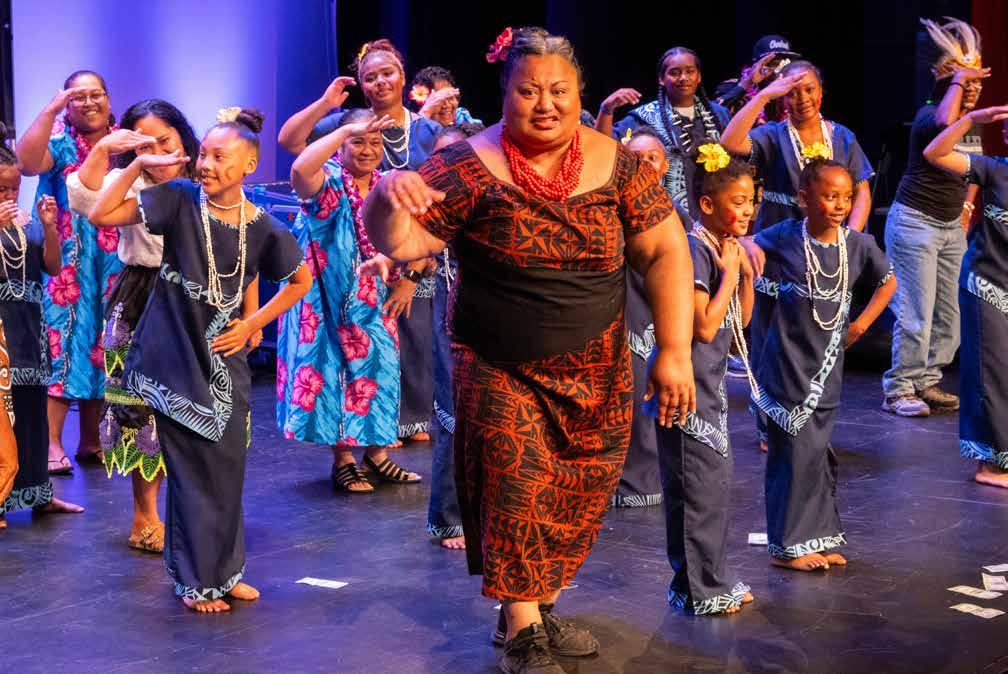
“My hands, my feet; my hands, my feet. My hands and feet, to uplift the village.”
Singing in her native language, Phylesha Brown-Acton recited the song written by her uncle about their home and community. Hailing from Niue, a small, selfgoverning island country in Polynesia, Brown-Acton was invited to be keynote speaker at MANAFest, a yearly event run by UTOPIA Washington celebrating Queer and Trans Pacific Island communities in Washington state.
Appointed a member of the New Zealand Order of Merit in 2019 for her LGBTQIA+ activism in the South Pacific, Brown-Acton is also fakafifine, a culturally specific Niuean third gender for those assigned male at birth but identify with a feminine gender expression.
“Today’s MANAFest is a testament to all our people,” Action said to the crowd on the campus of Green River College. Drawing on the importance of cultural activities featured at the event, Action proclaimed, “Art is a connection for Pacific Island people to our ancestors, culture, and our land. We must take a proactive role in preserving our heritage.”
While families and distinguished guests adorned with lei garlands watched attentively, others casually roamed the various booths and vendors, munching on malasadas (fried dough with fillings) and other goodies.
Several groups took to the MANAFest main stage that afternoon, representing traditions from across the Pacific, like the Manuia Performing Arts Academy (a Samoan cultural dance group), led by Naya Tuiasosopo.
Inside the Student Union Hall, Pasifika Village cultural workshops featured performances by groups like Hearts for Kids with Ala Talo, alongside traditional arts and crafts such as elei printing (a traditional Samoan art of fabric decoration) and designs taught by Brown-Acton.
Toward the end of her keynote speech, Brown-Acton emphasized that when it comes to diaspora communities, often living far away from home, “Our arts and culture are fundamental to our well-being.”
Falefia Jr. Brandon Fuamatu
UTOPIA Washington’s story, much like the Queer and Trans diaspora communities
it serves, has been one of creating a sense of home and community in the Seattle area, and for its director of development, Falefia Jr. Brandon Fuamatu, his story of dedication to community service has been no different.
Accepting the SGN ’s invitation to a talanoa (sharing story) as he called it, Fuamatu described his journey with the organization. With his professional background working in music in Hawai’i, he moved to Washington in 2021 to become the events and production manager with UTOPIA Washington, starting in the middle of Pride Month.
“Every month is busy for UTOPIA Washington, but Pride Month was a great experience for me to jump in. I think my first day, the entire organization went to go table and support Taking Black Pride, which happened in Seattle.”
From there, Fuamatu’s role has gradually
grown. Now as director of development, he is the lead grant writer, oversees all partnerships, handles the language of community programming, and manages intentional relationships with funders.
But another important feature of Fuamatu’s role is event planning. Every year, UTOPIA Washington holds two major ones: the Miss Island Goddess Pageant in the spring and MANAFest in the fall.
“Those are the two events that I support Taffy [the executive director] heading to organize all throughout the year. So once we’re done with MANAFest, we jump right into the pageant and back and forth.”
Fuamatu explained how UTOPIA Washington’s mission over the years has evolved to incorporate a broader, intersectionalitybased framework. “We are actively replacing systems of oppression with ecosystems of care and safety for all our communities through Black and Brown organizing,
prioritizing land above the economy, and reclaiming our cultural narratives,” he stated.
Recognizing the larger role UTOPIA Washington has begun to play, Fuamatu acknowledged that the organization’s scope is “ever expanding, and also includes our allied communities and broader Pacific Islander communities, recognizing that Washington has the third largest growing Pacific Islander community in the country.”
Part of this expansion has been collaboration with allied communities and other LGBTQIA+ organizations. For example, Unkitawa is a nonprofit based in Kent, dedicated to serving Native American communities through art and other cultural activities, with which UTOPIA Washington works closely. UTOPIA Washington also works with representatives of the Muckleshoot Tribe, as Fuamatu noted, to help inform how it should support the rights and
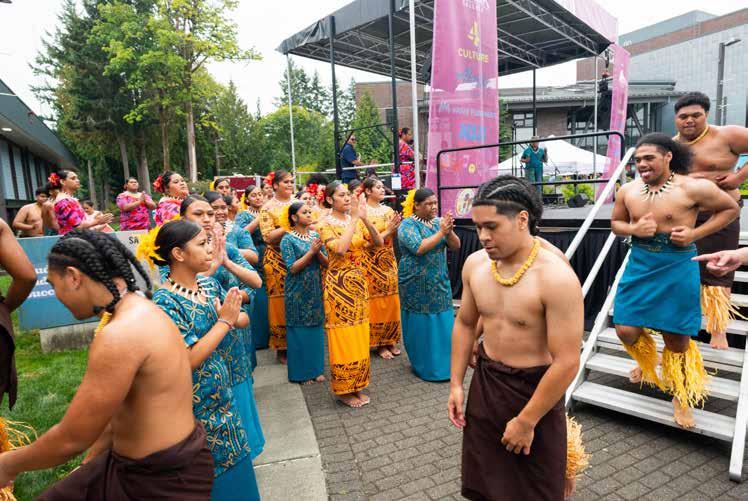
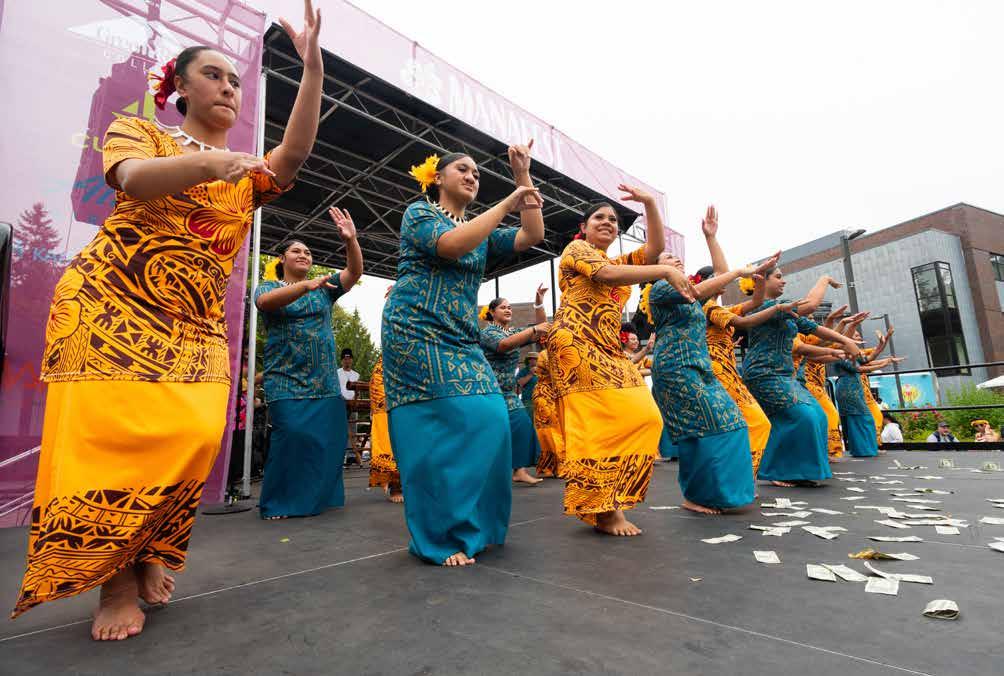
customs of Seattle’s First Peoples. As for LGBTQIA+-specific organizations, Fuamatu spoke fondly of the Lavender Rights Project, saying the group “is a very strong partner and collaborator — conspirator, if you would — of ours. We like to partner with them as much as we can.”
Evolution of MANAFest
In 2010, UTOPIA Washington began MANAFest as a simple community fundraiser for its programs, and support communities back home across the Pacific. But over the years, as Fuamatu pointed out, it has evolved and expanded alongside the organization.
Before the name was changed last year, the event was known as the Utopia Annual Lūʻau. Fuamatu explained that “lūʻau is the word that is shared among Pacific Island cultures, which is basically a celebration where there [are] cultural presentations, protocols, and food.”
This annual lūʻau was held at the Muckleshoot Casino as a gala-style fundraiser, with production spearheaded by UTOPIA Washington’s Queer and Trans members, “from the writers, to the actors, to the singers, to the musicians, to the dancers,” Fuamatu put it.
Then in 2024, the organization changed the name to better encompass its purpose as a Pacific Islander community gathering. Fuamatu said that the first MANAFest was quite different from this year: “We had a week of free events for the community that included specific days in which we celebrated Pacific Island foods, history, and cultures. Another day, we celebrated bringing together groups of our communities to put on productions and perform.”
After assessing the change in political climate, Fuamatu said UTOPIA Washington decided to shift MANAFest into being a free and for the public, “to make sure that this event supported all of the Pacific
Islander and local businesses that exist here in Washington.”
Fuamatu was proud to report on the success of MANAFest this year, both in terms of the cultures represented as well as community performances and activities. He also spoke of the long-term, intentional relationship building UTOPIA Washington has done with organizations and sponsors like Kaiser Permanente and Alaska Airlines over the years. When asked why they should continue to support the work of Queer- and Trans-led organizations like UTOPIA Washington, now and in the future, Fuamatu stated, “I think they see the strength in the way in which we operate, being able to bring together everyone, how accepting we are of everyone, to be able to provide spaces [where] we can all gather, and it can be positive spaces, it can be fun spaces, it can be a space for all.”
Regarding the current hostile climate toward diversity, equity, and inclusion
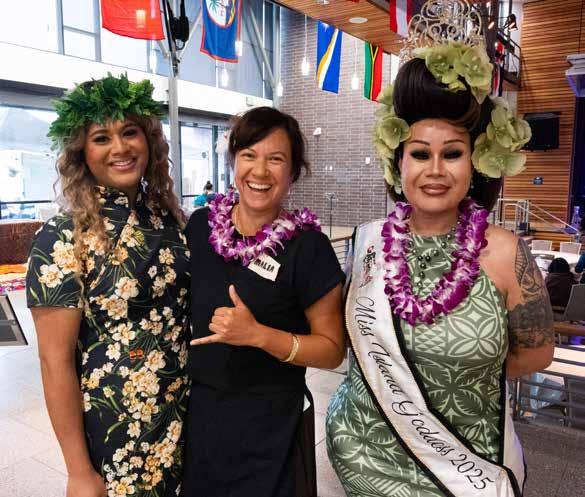
(DEI), Fuamatu said resolutely, “It’s nothing new to our history. It’s nothing new to how we live our lives and experiences, and what we have experienced and what we’re continuing to experience from this administration. And I think it also shows these larger organizations that we will operate the way we operate regardless of who the administration is, regardless of what they’re trying to do to silence our communities.”
Back on the MANAFest stage, cohost Manu Samoa Henry Sataraka highlighted the importance of unity among the Pacific Islander communities, saying that despite their differences and home islands being separated by bodies of water, “The ocean doesn’t separate us; it brings us together.”
More information on UTOPIA Washington and its services can be found at https:// utopiawa.org/

BY ARIN WALLER

Located in downtown Seattle, the Seattle Fat Mall is a plus-size clothing boutique and community hub, offering a safe and inclusive space for people of differing body types.
At the front of the mall (in a former office building that has been repurposed to comprise several vendors) is Curvy Cactus, a resale and upcycled fashion store with a distinct PNW style. Two sisters, Amber and
Alyss Seelig, began it in 2021 as a pop-up store at the Fremont Market. Since joining the Seattle Fat Mall, customers have enjoyed the broader selection of sizes and styles.
One of the other three original vendors is Heavy Duty Vintage, a vintage and secondhand clothing store for plus-size people. The store is helmed by Kim Selling, a self-identified “Queer, fat, and disabled”
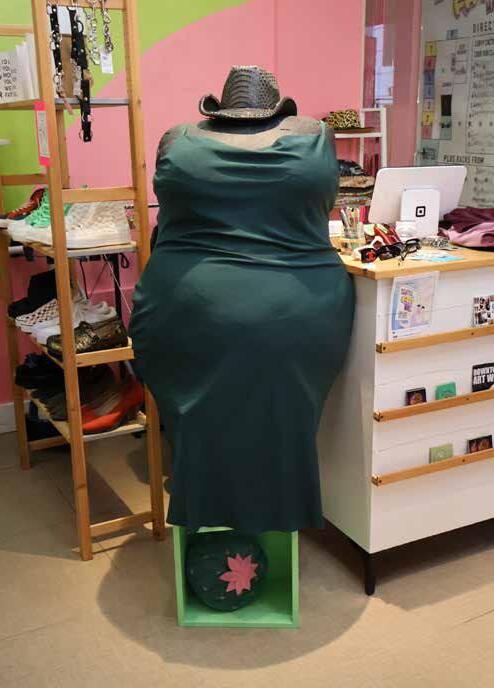
woman, as well as the founder of Fae-fest, an all-Queer Renaissance fair in Seattle.
One of the newest vendors, since July, is Honeypots Closet, a clothing reseller and sexual wellness store run by Jennifer Larkin. Her store also sells book packages, with face masks and beauty products, some with erotic books and toys.
There’s also Tiger & Mermaid, an alterations and tailoring service, operated by
Christian and Rye Magdaleno-Schroeder (Christian is a Two Spirit trans-masc person, and Rye is genderfluid). Their services offer measurements for people wishing to present as more masculine or feminine, as well as measurements for drag queens with padding and for neurodiverse people who are uncomfortable with touching or have certain texture aversions, so they can “be happy in what they wear.” Chris-
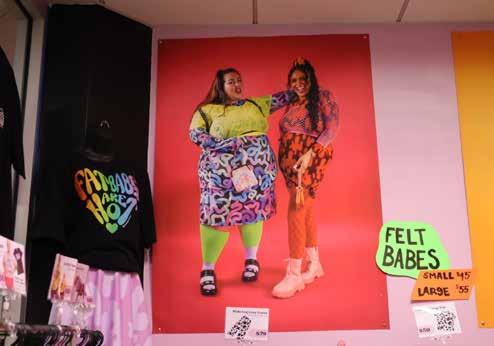
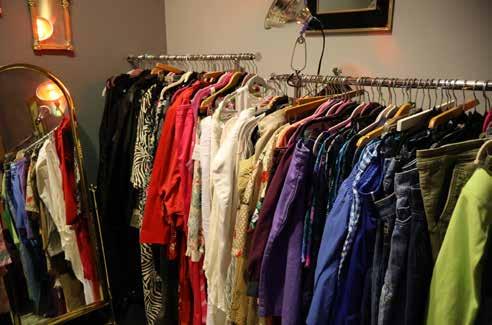
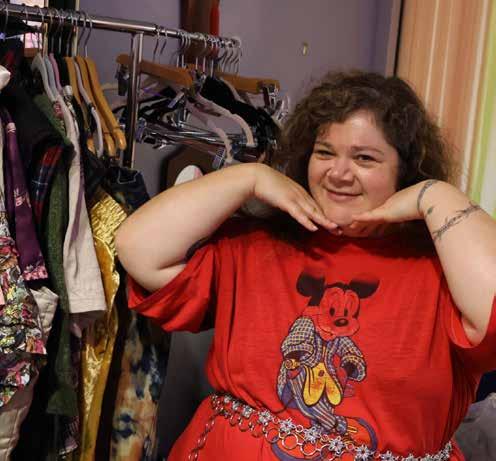
tian explained that he “started in cosplay, morphed into doing clothing.” He also expressed the challenges of being Queer and plus-sized when going into alterations, with the biggest struggle being keeping clothing and continuing to wear it as one’s body or gender expression changes.
The current owners of the mall will end their possession at the end of 2025, and so they are looking into multiple other locations, in addition to the possibility of extending the lease.
Societal trends
Candace Frank of Chub Rub Clothing spoke to the SGN about the history of the mall and the community that sprang from it. The idea began with both Curvy Cactus and Chub Rub, with the former having acquired the space in December. In April, various stores and vendors began using
segmented offices, transforming the location into a makeshift mall, along with a lounge near the back to provide that supportive community aspect.
Frank described coming into this shop as “being inside my happy place... It’s kind of is amazing to see other people’s reactions to it as well… I could come in in the worst mood and within maybe ten minutes, it’s totally back to good feels.”
Having the space set up in this manner does have drawbacks, she admitted, as each of these segmented stores needs to be managed by its own vendor, which is not as time-effective for small business owners compared to an open market.
Ms. Frank also discussed intersectionality in terms of the Trans, Queer, and plussize communities. She opened up about being intersex herself and having polycystic ovary syndrome (PCOS), resulting in

her body producing both testosterone and estrogen, along with weight gain.
She also said that because AMAB people generally have larger frames and because a side effect of gender-affirming care is increased production of estrogen, which is associated with weight gain, there are a large number of Trans people who come into the shops. She said that many Transmasculine people visit, and the mall even hosts a monthly masc-wear event.
Frank also discussed how the fatphobia of the ‘90s and early ‘00s yielded to the body-positive movement of the 2010s, and how the trend of Ozempic being marketed for weight loss has brought things full circle. America’s approach to crash dieting has been linked to damage to metabolism, however, and this pursuit of being seen as fit has resulted in a less healthy population.
While Chub Rub and the Fat Mall see
their fair share of fatphobic comments on social media, from what Frank described, their detractors are mainly teenage boys who are at a time in their lives when they have this idea of what society expects them to be, and that increased pressure to conform causes them to lash out at other people who don’t fit the mold.
For the most part, the experience has been positive, however. “We get thank-you messages all the time. We get people in here crying about how much it means to them to have a space where they know that they can be safe and accepted and be themselves,” Frank explained. “I think the reception is definitely more good than bad.”
The Seattle Fat Mall's schedule can be found on its Instagram page at https:// www.instagram.com/seattlefatmall/
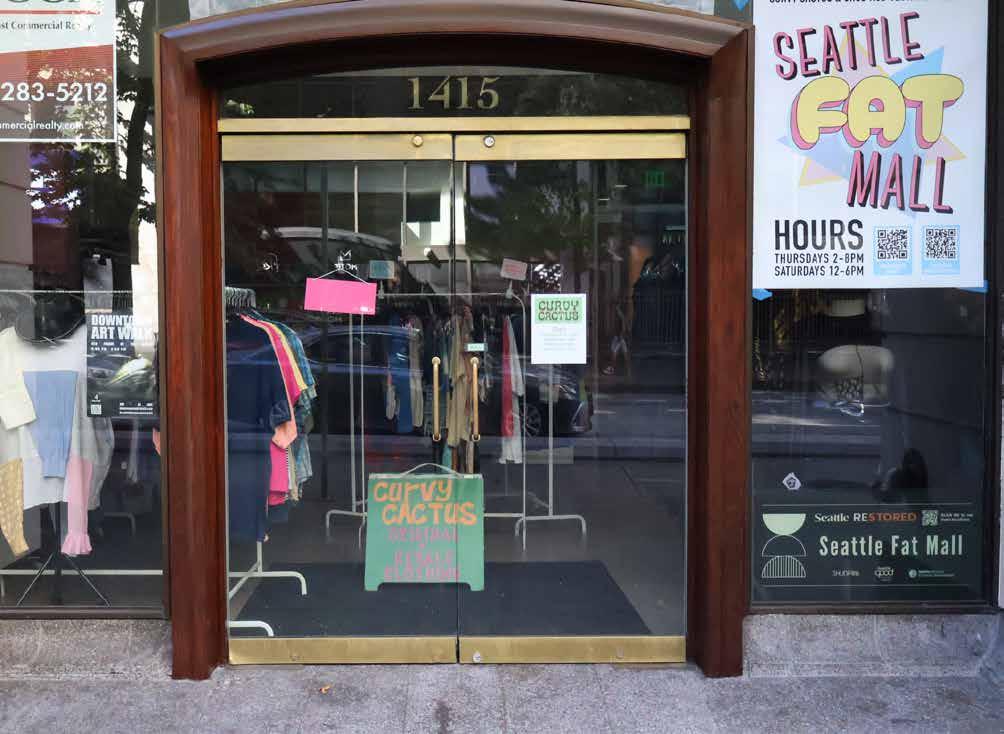




















Did you know Ar t enhances brain function, improves mental health, encourages empathy, and promotes hope.
All That Goes Without Saying Filling the Silence
John L’Esperance Retrospective October 3-26th


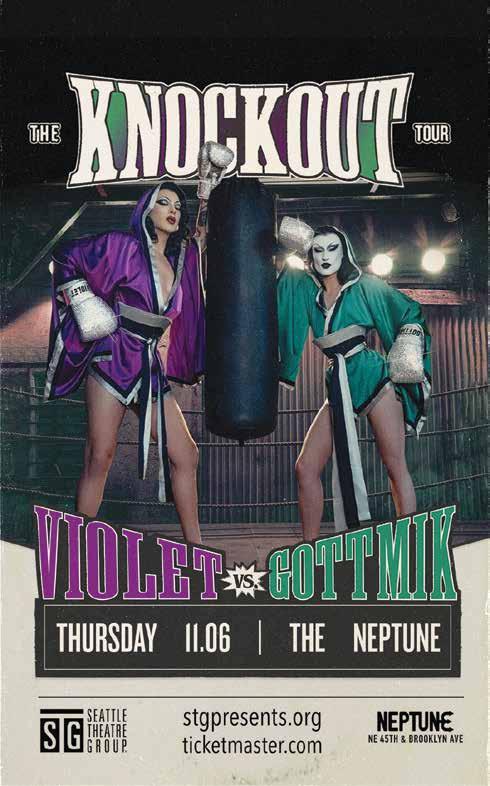
L’Esperance’s work is a testament to resilience and the transformative power of ar t Opening reception October 11th 5-9pm
Whimsey in Thread, Beads and Ceramic: Ellie Fernald Retrospective Benef it October 19 2-4pm with live music and ref reshments th

“Fogue is like its own ar t walk all in one building, the breath of the work is amazing, but it is the community of ar tists that will keep you coming back ”
@foguestudios com 12-5pm Wednesday - Sunday

BY MADISON JONES SGN MANAGING EDITOR
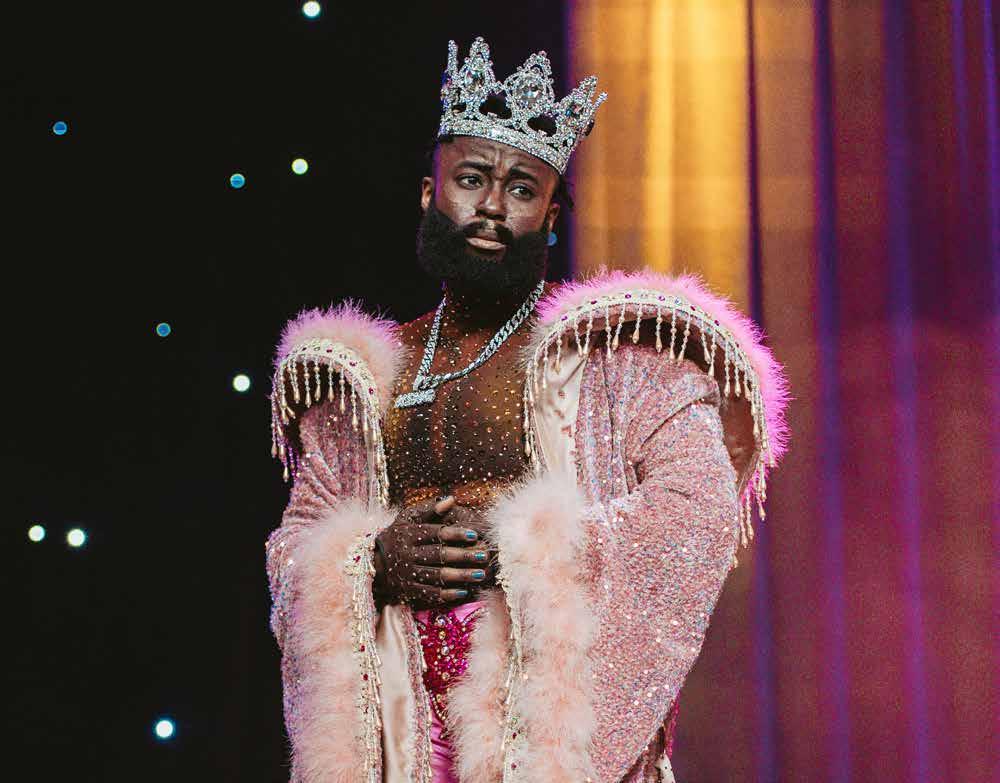
“For the longest time, I never felt like a girl. I also never feel 100% like a man. It’s always been this spectrum of existence,” said Trans drag king Tuna Melt on King of Drag, an original series on the free, Queeroriented streaming platform Revry.
Released in June and hosted by the selfproclaimed “hardest-working middleaged man in show business,” drag king and comedian Murray Hill, King of Drag is a marvelous, first-of-its-kind competition series dedicated exclusively to drag kings. The contestants represented in its first season cover a wide spectrum of styles and lived experiences from across the US, from the zany Minnesotan Dick Van Dyke,
to Atlanta’s Pressure K, to Bellingham’s Big D, just to name a few. Alongside the Queens-based Tuna Melt, several other contestants in season one come from the Trans and Nonbinary community, including: Alexander the Great (Austin, TX), King Perka $exxx (Charlotte, NC), and the winner of the season, King Molasses (Washington, DC).
As part of the grand prize package for winning, King Molasses will be given a headlining spot at the Emerald City Kings Ball in Seattle (September 25–27). Multiple members of the cast will also be present at the event as part of a panel.
The SGN, in preparation for the cast’s visit
to Seattle, talked to Damian Pelliccione, CEO of Revry and cocreator of King of Drag, about its successful reception so far.
Revry
Pelliccione told the SGN that, he and three other cofounders — Chris Rodriguez, Alia J. Daniels, and LaShawn McGee — began Revry 10 years ago in Pelliccione’s living room in Echo Park, Los Angeles, then built it into the business that it is now.
(As an online streaming platform, Revry offers LGBTQ+ entertainment for free by having advertising during its programming.) Pelliccione reported that Revry currently employees 30 people in New
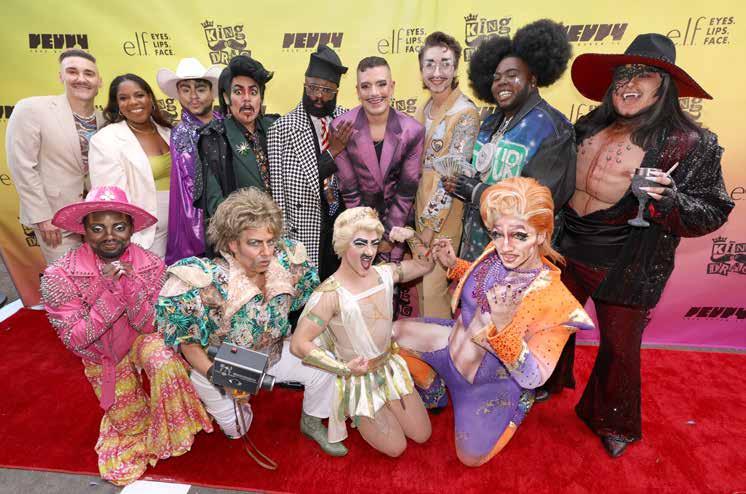
York and Los Angeles, and had 6.8 million monthly active viewers at last tally.
When asked to describe the business philosophy behind Revry as an LGBTQIA+ brand, Pelliccione said that in a US political climate less friendly to social justice causes, “there is an impact, a social-good component to what we do. You know, we always say that in our mission statement: we’re here to represent Queer joy, and that kind of takes precedent.”
Pelliccione explained how Revry has a social role to play through exposing the public to LGBTQIA+ perspectives, “I always say Queer is a culture, [because] then it normalizes kind of the experience, the Queer experience, for non-Queer people,” they said. “And I think that’s really important. I think media has the power to do that. And I think with Revry, we’re able to do that.”
Revry has produced several original shows over the years, and before King of Drag had featured drag kings, like Androgen in House of Pride 2021. But they explained that the network eventually came to the idea for King of Drag because “we’ve always been a big supporter of the drag king community, and we realized very early on that there [were], you know, drag kings that were not being cast in mainstream shows other than, like, Dragula.”
According the Pelliccione, it became apparent to the Revry team that “this is a whole side of drag artistry that was just not getting a platform.”
Advertisers
King of Drag didn’t come about overnight, Pelliccione said. Revry took three years to finally get the show into production and launch it. One struggle the CEO shared about the project’s development was finding a presenting sponsor. With two weeks left before production, a last-minute ask to Elf Cosmetics ended up being accepted. As Pelliccione explained, “They were a great supporter of the show and … the artistry and put a lot of resources toward this.”
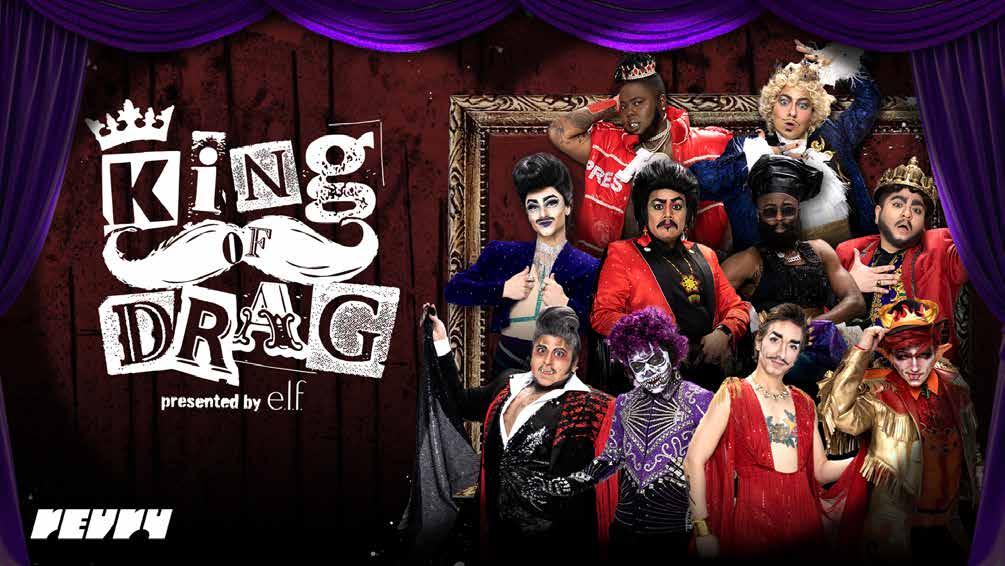
As for the overall withdrawal of Queeroriented ad campaigns by corporations — and how, in spite of it, Revry is still able to make the case to these profit-driven entities to invest in LGBTQIA+ content — Pelliccione put it in terms of economics and demographics: “Let’s just talk about how powerful the LGBTQ+ dollar is. In the United States, we spend $1.7 trillion in disposable income. That’s just our community, and we’re the third largest consumer group. First largest consumer group is white, second is Hispanic, third is LGBTQ+, and Black, then AAPI. So if you are a brand, it’s good business.”
Pelliccione also pointed out that among younger age groups, LGBTQIA+ people have numbers: “And then we look at Gen Z and millennials, millennials being double the [number] of LGBTQ+ folks [9.8% compared to Gen X’s 4.5% according to Gallup], and Gen Z being triple the [number] of … millennial [people] [22.3%] that are LGBTQ+. So the younger we get, the Queerer we get. So if you are a brand, and you want to exist in the next 5–10 years, you have to address this audience. If not, you’re going to be left aside.”
Pellicione, who is excited to travel to Seattle for the Emerald City King’s Ball, told the SGN what the King of Drag cast has planned for the event. “Thursday, we have our panel with Dick Van Dyke and Perka $exxx and my cocreator, Chris Rodriguez, and then we are crowning King Molasses on Thursday night. We actually have the official crown. It’s in my bag right now that I’m taking with me.”
Sherwood Ryder, a local drag king and cofounder of the Emerald City Kings Ball, discussed the ball’s history and growth, telling the SGN that back in 2021, the idea
“started as an off-the-wall conversation in a green room between Faberg’ee Greg and myself.”
The two performers had noticed that there weren’t any events at the time that celebrated the artistry of drag kings specifically. So in 2022, they decided to create an Atlanta-style players ball for drag kings in a two-day showcase at Factory Lux (now known as Mountain Room Bar) beneath the old Rainer Brewevry. Ryder reported that the community response was overwhelmingly positive: “Everybody had a great time, and the feedback was: we want more of this and we want it now.”
Over the next two years, the ball’s organizers moved the event to Skylark and turned it into a three-night affair. Sherwood explained that each night has a (nonmandatory) theme for the attendees, and on the third night, they do their competition, at the end of which, the ball awards titles. As Sherwood explained, “We crown our court. So we have our high king supreme, which is first place, and then second place is our imperial duke, and then our third place is our grand marquis.”
The past two years at Skylark, they have had to turn people away at the door because the event would be so packed, Ryder noted. Ryder also said the event is international: “Most of our international friends are our Canadian boys. They come in from Vancouver and Toronto.”
This momentum of its success is what led the event to move again this year to the Langston Hughes Performing Arts Center, which Ryder pointed out has also sold out. “It’s just a blessing at all that we’re even thriving like this,” Ryder said gratefully.
Regarding how Revry reached out to the Emerald City Kings Ball about King of Drag, Ryder said that the show contacted them after casting and before the
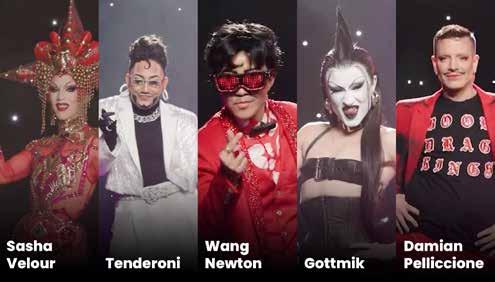
season aired about being a part of the winning prize. Ryder explained that “the prize package for the winner was [an allexpenses]-paid trip to Seattle and a headlining performer spot at our festival.” This will be the first time a winner from King
The first season of King of Drag can be found at https://www.revry.tv.


BY AUDREY OSCARSON
SGN STAFF WRITER
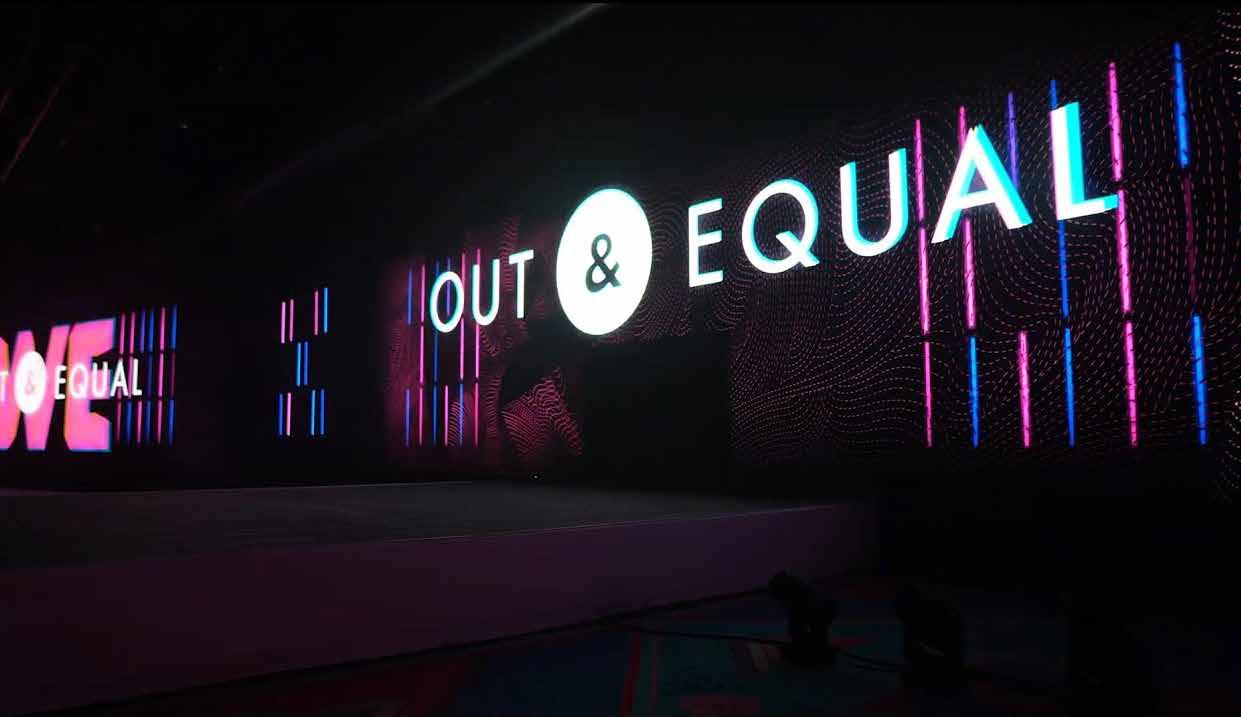
For decades, Out and Equal has been connecting businesses with resources and training to make the workplace a more equal and accepting place for LGBTQIA+ people. Now, its biggest event of the year, the Out and Equal Workplace Summit, will be coming to Seattle, October 13–16.
This four-day event will include panels and training to facilitate better work environments for LGBTQIA+ people, networking opportunities, and time to celebrate being a Queer professional. As the world’s largest gathering of LGBTQIA+
and allied professionals, it is sure to be a memorable and valuable experience.
Since the late 1990s, Out and Equal has been advocating for the Queer community on a federal level. A large portion of its work revolves around training for companies, including resource groups, micro-learning lessons, and recognition programs.
As anti-LGBTQIA+ policies proliferate, Out and Equal’s assistance with navigating legal and social changes has become more important. Its strategies help to advance
workplace inclusion in a way that is sustainable and beneficial to the success of the company. For partners, its resource library’s wealth of information is available to use, though there are some free resources as well.
This year’s Out and Equal Workplace Summit, hosted at the Seattle Convention Center, will include talent and thoughts from icons such as Janelle Monáe, DJ Hannah Rad, and Harper Steele. There will be opportunities for networking and celebration, and, of course, the 2025 Outie
Awards. Designed to honor those making changes within their organizations, the awards cover five categories, ranging from employee resource groups to allies that go above and beyond.
With over a hundred sessions scheduled, the summit is sure to be a weekend rich with learning and community.
Those interested in attending can visit outandequal.org for more information

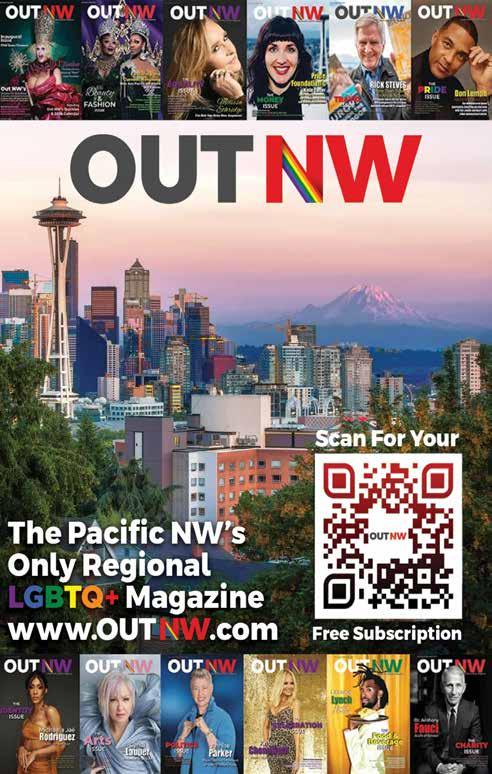





BY PERRIS LARSON

We live in a society that stigmatizes even the mere mention of death. Reasons include it being too sad, too morbid, too depressing — to the point that few will talk about or even plan for it. That is where the Co-op Funeral Home of the People’s Memorial Association comes in. Through education, advocacy, and fundraising for affordable deathcare, it pushes back against the stigma, bringing death into the conversation.
Managing funeral director Chris Ronk has been with the organization since its opening in 2007, and takes pride in the Co-op continuing to prioritize affordable deathcare while other funeral homes across the nation continue to double their prices.
“We are all here because we feel very strongly that access to affordable, dignified deathcare is a social justice issue,” Ronk said.
What people don’t realize at first about this particular home is how much of a safe space it is for Queer people. While it has a range of clients, there is an affinity with the LGBTQIA+ community, as many of the staff members are a part of it.
Brendan Dieffenbach is the office manager for the home, and one of the first people that families meet.
“I can frequently see a relief, a [lowering] of the shoulders,” Dieffenbach said. “We’ve got the Pride flags up, and then there’s me being visibly Queer — it’s relaxing there.”
At Trans Pride, the funeral home makes it a point to educate members of the Queer community and show how easy it is to fill
out important documents when it comes to making arrangements. What a lot of people do not think about is who takes care of their remains after they pass. For those without have children or spouses, the responsibility passes to the closest blood relative unless otherwise designated.
“I think when straight people call to ask if they can prearrange, they typically say it’s so their kids don’t have to worry about anything. Which feels like a privilege,” Ronk said. “When Queer people want to preplan, it’s for their safety and for their peace of mind.”
For some in the LGBTQIA+ community, having a blood relative decide their funeral arrangements — sometimes a homophobic one — is the last thing they want. So the Co-op hands out documents for naming a designated agent for funeral arrangements at every possible opportunity, including its upcoming “After Party” fundraiser on Oct. 4. (Forms are also available online at https://www.funerals.coop/forms/before_ death_occurs.)
The event promises spooky mayhem, including live music featuring Headstone Brigade and Fiddlin’ Kenny Webb’s “friendsoftheroad” Funsemble. With tarot readings, gift caskets, and boos-y drinks, it will be a haunting evening to remember for those who just want a frightful night out, or for those who want to learn about the variety of burial options.
Speakers from Recompose, Return
Home, Resting Waters, and End of Life WAwill inform guests that decisions about final resting places don’t have to be narrowed down to just cremation and traditional burial. In fact, there are other ways to be remembered and laid to rest, terramation and aquamation to name just a couple.
The After Party, a 21+ event, will be held at Mini Mart City Park from 6 to 9 p.m. on Oct. 4. More information can be found at https://peoplesmemorial.org/memberhub/the-after-party.html


The GSBA is a 501(c)(6) nonprofit chamber of commerce created for one sole purpose: to advocate for the advancement and protection of LGBTQIA+ businesses and organizations.
Founded in 1981 by nine Gay business owners, including insurance agents, attorneys, and bar and bathhouse owners, GSBA was initially formed as a networking group. Over time, the organization evolved into a platform from which Queer business leaders could advocate for protections in the city’s public agencies like the fire and police departments, as well as build up the overall economic power of the community. In 1991, its members also founded the first LGBTQ+ Scholarship Fund, which has since awarded over $7 million to hundreds of students.
With its office still on Capitol Hill today, located just above Gay City: Seattle LGBTQ+ Center, the GSBA continues its long-standing mission of serving the community. Now the largest LGBTQ+ and allied chamber of commerce in the US, it boasts a diverse of membership of leaders and businesses. According to its Who We Are web page, the organization states, “We represent small business, corporate, and nonprofit members who share the values of promoting equality and diversity in the workplace.”
In light of SGN ’s “Home & Finance” issue, the GSBA’s senior membership development manager, Alison Scott, gave an in-depth interview to showcase the array of services and events the organization offers its members, and shared what it’s like to work at Seattle’s LGBTQIA+ chamber of commerce.
New GSBA team
Scott started her current role with the GSBA in May, having previously served the organization as a volunteer. As a selfprofessed strong ally of the LGBTQIA+ community, she said that hearing the story of scholarship recipient Danny Cords is what got her hooked on working for the organization. Cords was sent to a Gay “conversion” camp as a kid but used his scholarship to help turn his life around. He has since gone on to become a member of the GSBA executive board. “Many applicants to GSBA’s scholarship program have a tough story to share,” she said.
Scott said that two other people joined the GSBA team in 2025: Jen Carl (Capitol Hill neighborhood safety coordinator) and Cortney Gosset (communications and events specialist). In the months since Scott became GSBA’s senior membership development manager, she has hit the ground running, helping to put on new projects for the organization.
For example, the Just Walk In program was created last summer as a Capitol Hill “passport,” with which customers could go to participating businesses, receive stamps, and earn prizes. Of running the program, Scott said, “For being newish to the team, it was a really fun opportunity to meet people

BY MADISON JONES SGN MANAGING EDITOR
in person.” She also said that feedback from businesses and customers was positive.
environment
As for what the environment is like as an employee of the GSBA, Scott described the schedule as a hybrid-work system. Like many modern workplaces, the GSBA relies heavily on Microsoft Teams to stay connected remotely, as she explained, “so that everybody has a feel for who is doing what.”
Despite this, Scott pointed out that the organization makes a concerted effort to keep its workers connected, with everyone coming in to the office on Mondays for instance, since the team is constantly out visiting its members. Scott emphasized the importance of having these face-to-face interactions with members to build business relationships, noting that it is “very different to sit down in person with members to talk about business than over a phone call.”
Scott said the GSBA prides itself on being a compassionate work environment, promoting a good work-life balance with its staff, and making sure people take care of themselves. One example is giving the staff the Monday after Pride off, affectionally called “Gaybor-Day.” The same goes for the Monday after the GSBA’s Equalux gala. “The team is working really hard during these tough times,” Scott acknowledged.
Membership
GSBA offers its members an array of services, from consulting and advertising to
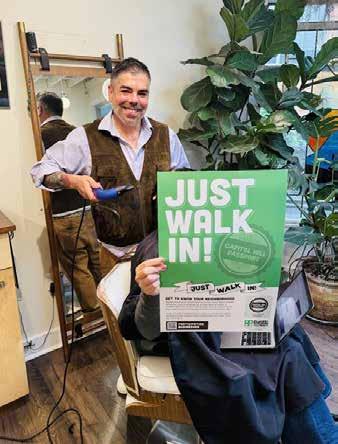
being added to its business directory and invitations to its networking events. The organization includes business of all sizes, from the micro to corporations, including what it calls a “Friends of GSBA” membership for individuals who aren’t part of a business or group but still want to be involved. New businesses get half off the membership fee in their first year, in acknowledgment of the struggle they go through getting off the ground. “I understand that I’m asking members to share their sparse, hard-earned budget for [membership],” Scott said.
However, part of the GSBA’s hope, Scott said, is that once new business members experience all the services and opportunities at their disposal, when it comes time for them to renew at full price, “it’s a nobrainer.”
But Scott also pointed out that membership with the GSBA is a two-way street. Those who engage more with the organization, whether it be attending events or fully filling out their directory entry, are more likely to maximize their benefits. “The more they engage with us, the more we can keep them top of mind,” she said.
Scott gave several reasons for why membership with the GSBA is not only beneficial but important from an advocacy standpoint. In her view, even if a company or business isn’t LGBTQ+ owned, many have Queer customers, especially in Seattle. According to her, a GSBA membership can help them to better support those cus-
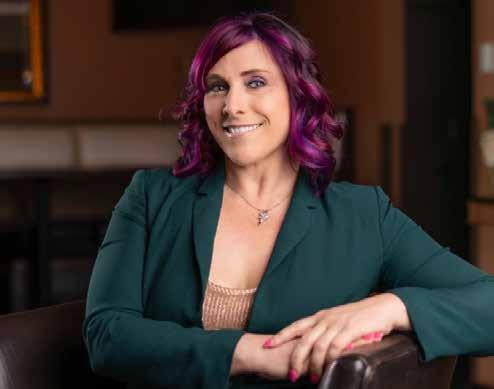
tomers. In addition, being a member of the GSBA can encourage LGBTQ+ applicants to work at that business, even if the applicants are just allies whose values align.
Scott acknowledged that although the GSBA was blessed to be in a city and neighborhood that is very Queer-affirming, the organization has also been struggling with the current political climate of corporations backing away from supporting Queer causes. She said that, since the beginning of the year, “some corporate members feel pressured not to be more visibly involved with the GSBA.”
However, others have recently been stepping up; for example, Uber became the title sponsor of Equalux. Scott said the GSBA leadership team recently came back from a national conference, where she met other LGBTQ+ business organizations that were smaller and located in more unwelcoming parts of the country. Although she commended them for fighting the good fight, she also expressed gratefulness for how much the Queer community is celebrated here in Seattle.
Events
Scott mentioned several upcoming events the GSBA has in store for 2025. On October 7, the organization will host a Hill Talk event at Capitale Pizzeria, as a free and informal get-together for businesses and community organizations to meet each other; it also gives the GSBA a chance to highlight a member. Scott said the event is “truly open to anyone wanting to come and meet.”
In contrast, Scott said that the GSBA will also host a more formal Power Connect event on October 21 at the Space Needle, to “make lasting business relationships” and “experience the power of meaningful networking with LGBTQ+ and allied business and community leaders,” according to the website, where tickets to the event are available.
Then, on November 8, the GSBA will hold its biggest fundraising event of the year, Equalux. Scott explained that the dinner and silent auction event helps to support the organization’s Scholarship & Education Fund, one of whose scholarships is Food Is Love, created after the passing of Tamara Murphy of Terra Plata, to help recipients pay for culinary school. She also highlighted the Build With Pride scholarship for students interested in construction and architecture. The fund helps support students in both two- and four-year colleges, and Scott revealed that the GSBA had recently added trade school programs to the scholarship program.
Finally, Scott emphasized the need for LGBTQIA+ groups to connect, now more than ever. She said people at the GSBA office have been embracing a new mantra: “Joy is a form of rebellion.”
Information regarding GSBA membership and event tickets can be found at www.thegsba.org.


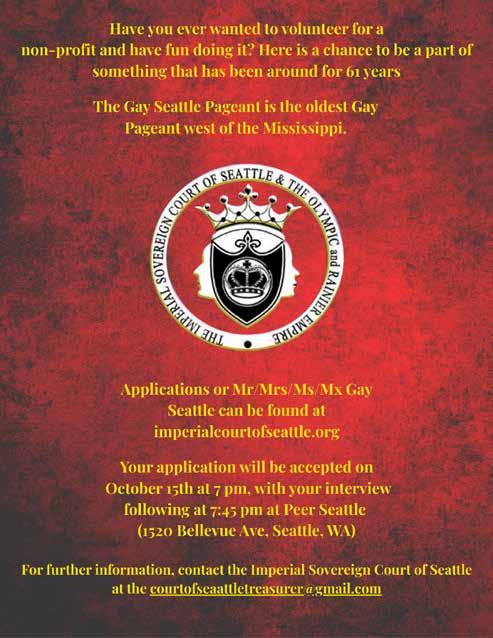







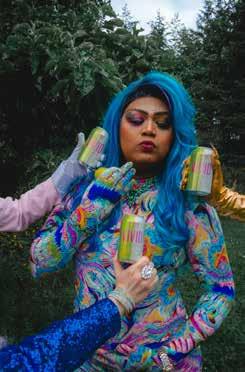




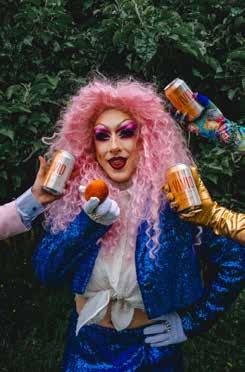
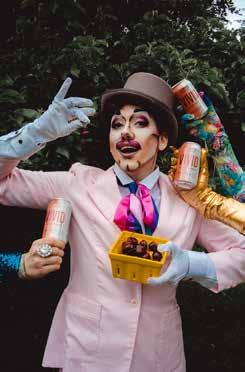











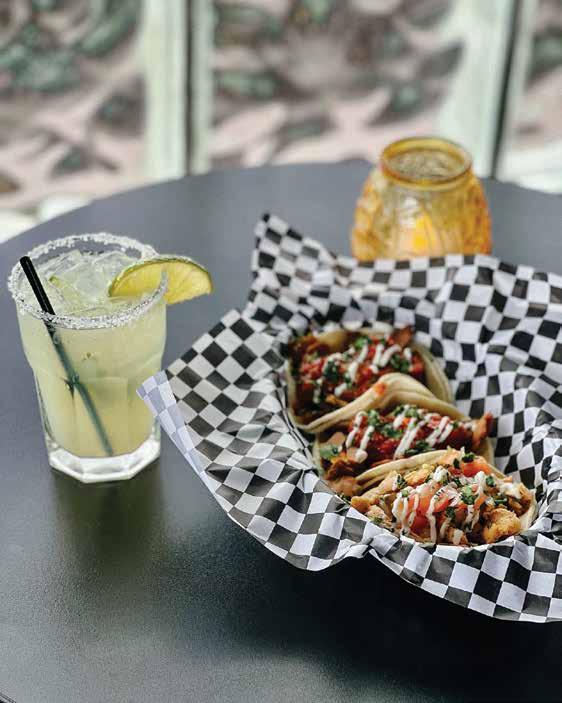
BY TUCKER CHOLVIN
By Tucker Cholvin
1* Comfortable, happy place *
8Seattle chocolate icon Bigelow...with an eponymous brand
12Former anti-LGBTQ group, ____ Majority
13Some of The Sopranos
16Store that has really gone to the dogs?
17Stunning sight
19Wouldn't commit
21Free-for-all
22Club or diamond
25What a crew needs to cruise
26Candidate and romance novelist Stacey
27North Cascades hike, Sahale ___
28Ger. neighbor
29Seattle pioneer Mercer
30Winter time in Wichita
31Activity at KUOW or KING
33Gov. org. at 1110 3rd Avenue in Seattle
34Jinkx and ____
35High-profile 39A example in 2001
36Past ___, as an invoice
37How many Seattleites get from August to December
38Pride participant at Woodland Park Zoo?
39Defraud or swindle
40Do a favor for
41Candy-heart word
42Sappho work, '___ to Aphrodite'
43Std. paper size
44Soul producer
45"That is to say..."
47Word after fish or drag
48What Boeing gets going
49Crypts
50Explorer Hernando
52Structures best kept private?
54"To repeat..."
58Pieces of punctuation
59"You've got some _____..."
60University of Maryland athlete
61Out of the woods...or a clue to the starred hints in 1A, 11D, 24D, 33D
1 Vera Project or Neumos need
2 "___ is me!"
3 It puts the A in SAM
4 Sight at Shilshole or Smith Cove
5 Ice sheet
6 Last Greek letters
7 Singer John with a Swift downfall?
8 N.Y.C.-area gay destination
9Robot vacuum brand
10"___ your instructions..."
11Mantra for Dorothy, with "there's" *
1433A employee
15Checks out
18Find them at Federal Way (I-5) or Indian John (I-90)
20Interior Secretary Burgum
22One of 54A in WA...or an Elon emission
23Substance once found at Hanford, WA
24* TV sitcom starring Tim Allen
26"Just ___ suspected!"
28Wilson of Heart, or Seattle City Attorney Davison
29First Republican POTUS, familiarly
32Lithium-___ battery
332006 graphic memoir by Alison Bechdel *
34Indian lentil stew
36Orcas Island Bay
37It costs $3 at Pony, briefly
3930A counterpart
40Eight, to Luigi
42Auto tracking system
43To a smaller degree
46Alphabet intro
47Singer Cherry
48Austrian emperor Franz
50Homer Simpson outburst
51The point of the Mariners' trident?
53Lumen, for example
55Pirate's favorite letter?
56"___ seen enough!"
57"Look at me, I'm Sandra ___"

